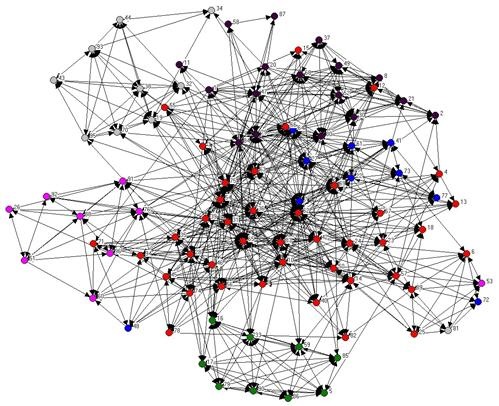
Original Post: October 12, 2018
[Above diagram is an unidentified communications network drawn from the Internet.]
According to Google Dictionary, “net neutrality” is a principle guiding the practices of Internet service providers: “enable access to all content and applications regardless of the source and without favoring or blocking particular products or websites.” The concept implies that Internet access and use should be without hierarchical arrangement: a flat web of communication channels, open to all, free of charge. The loss of net neutrality, then, becomes the loss of a utility or the denial of a right. The term “net neutrality” seems a misnomer to me and the threat of the loss of net neutrality seems misleading or, in the least, disingenuous; because the empirical practices of Internet service providers often fall short of the normative expectations of net neutrality.
The annals of Sociology tell us that communications create and confirm the social organization of participants and, as such, are rarely flat, equally accessible, evenly distributed, unstructured. In complex organizations, e.g., directives normatively flow from top positions down to line or field workers, while information about line or field operations flow up a hierarchical chain of command. Even in newly formed small groups, “sociometric stars” arise as hubs of communication in terms of, e.g., the number of channels and frequency or content of messaging. The organically formed sociometric star is the natural leader of the group.
In real estate practices, the sociometric star is the top producer for a development, neighborhood or particular type of property. This is the person with the greatest visibility, the greatest production in listings and sales at fair market values, on a controlled and validated data site, as is the Multiple Listing Service (MLS) in Illinois, carefully and ethically managed by Midwest Real Estate Data, LLC. (MRED). The MLS, managed by MRED and used by licensed brokers, follows a strict set of rules and checks to maximize the reliability and validity of data sets and images. Many popular websites, used by the public to search for properties and realtors, do not have the same rules and checks for consistency and truth. Realtors, wishing to increase their visibility and enhance their brand, may pay to have their name supplant that of the listing agent, pay to have their contact information readily available to the unsuspecting consumer, pay to have their name listed first or appear on the opening page of a search for properties or real estate services, pay for fake favorable reviews and testimonials. Until net neutrality truly exists, consumers should critically assess the structure and content of websites, guided more by profit motive than a commitment to validity and ethics, before selecting a realtor and real estate services.


 Facebook
Facebook
 X
X
 Pinterest
Pinterest
 Copy Link
Copy Link